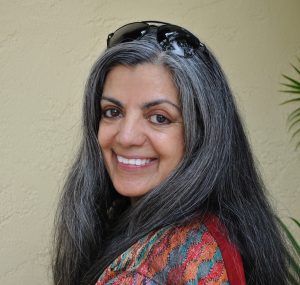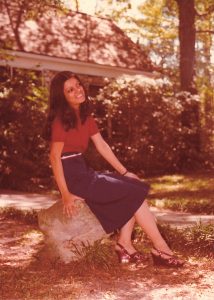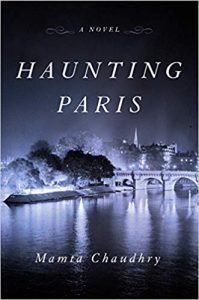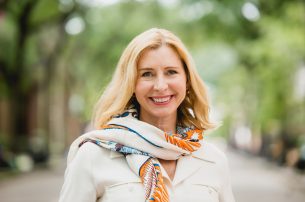ALUMNI: Mamta Chaudhry Fulfills Her Dream with First Novel “Haunting Paris”
By Denise Truck Krigbaum, M.A.M.C. 1997
Luck was with Mamta Chaudhry, M.A.J.C. 1979, the day she arrived at Gainesville airport to begin a master’s degree program. As she changed planes in New York, airline agents had misread her handwritten ticket issued in India and put her on a plane to Greenville, South Carolina. Only when she told someone as she was boarding that she was starting school at the University of Florida did they catch the mistake and hustle her onto the correct plane.
 “I remember collecting my bags in Gainesville airport out front, where they were piled on fruit crates or something,” Chaudhry said. “To people in Florida, Calcutta seemed so exotic, but to me Gainesville was so exotic.”
“I remember collecting my bags in Gainesville airport out front, where they were piled on fruit crates or something,” Chaudhry said. “To people in Florida, Calcutta seemed so exotic, but to me Gainesville was so exotic.”
That was 1977. Despite its initial unfamiliarity, Chaudhry said Gainesville, and the University of Florida, became home to her from her earliest days in the States. And it started her journey into creative writing leading to her first novel, Haunting Paris, which will be released in June 2019 from Nan A. Talese/Doubleday.
“All the friends I met in Gainesville I am still friendly with, and the man I met there, I’m still married to, so Gainesville really took me into its heart,” Chaudhry said. “It’s certainly in mine.”
She and her husband, whom she met in a graduate communications seminar, eventually made their home in Miami. “He carried my books one day, and he is still carrying my books. He still reads every draft,” she said.
Before she moved into creative writing, Chaudhry studied broadcast journalism and worked at WRUF’s classical music station. The experience became the foundation for a career at classical music stations in Texas and Miami.
After years in broadcast journalism, she embraced her love of the written word and went for a doctorate in English at University of Miami. Sometime after she began teaching English literature at UM, she realized she wanted to write novels, not write about them.
Chaudhry never enrolled in an MFA program in creative writing, but even when she attended UF she gravitated toward it.

“I did take a class with [UF Creative Writing faculty member and novelist] Harry Crews, and that was the depth of my formal training,” she laughed. “Even when I was in Gainesville, I focused on creative non-fiction. Tom Wolfe, etc., those writers telling non-fiction stories with a point of view.”
She worked at the Independent Florida Alligator where she wrote movie reviews and even once interviewed Ken Kesey, author of “One Flew Over the Cuckoo’s Nest,” counter-culture guru, and early mentor of the Grateful Dead. Chaudhry says her guiding principle has been to consider literature as journalism that lasts.
“I was never into hard news, probably because I focused too much on what to do with each sentence to write a story on a deadline,” she said. “I was more interested in feature writing and what it tells you about what is going on in the world. It can be of substance, too.”
She said she always wrote, even as a high-school student in Calcutta. But about 15 years ago, she began to attend the New York State Summer Writer’s Institute at Skidmore College, in Saratoga Springs. It was there, she said, that her writing changed dramatically under Pulitzer-Prize winning author Marilynne Robinson’s tutelage.
“For a long time, I never had the courage to write and say, ‘This is what I’m doing,’” Chaudhry said. “I finally did and after many, many years this book will be coming out. It’s not the first book I wrote, but it is the first one to be published.”
Chaudhry was inspired to write about Paris on her first visit. Right away, she said she felt like she knew the place, its energy and its history. Peering into a window, her imagination slipped inside a room sparkling with lights. She saw flickers of the lives of the apartment’s residents. This moment led her into the story that would become Haunting Paris.
“For this novel, a lot of it was inspired by Paris and a really strange feeling of having been there before, yet being a complete stranger,” Chaudhry said. “A kind of double vision and looking into a lighted window and imagining the lives going on inside, a drift of music and saying, ‘Who are these people? What kind of lives are they living that I’ll never know?’” Perhaps not surprisingly, given Chaudhry’s experience, one of her characters is a classical pianist.
“It doesn’t matter where your book is set, you always take yourself with you. The story reflects things I’m interested in, which are love and loss, and secrets and the courage to speak out. Also my love of music is in there. There are a couple of Americans in there and one of them is an English professor. I’m not saying it’s autobiographical, but maybe emotionally autobiographical,” she said. “For instance, you may not have lived through the Jewish roundup in WWII Paris, but you know what fear is. Paris brought so many of my passions together.”
Marly Rusoff, Chaudhry’s literary agent in Manhattan, says there is indeed a natural relationship between fine prose storytelling and classical music.
 “A novel keeps you turning pages if the pacing is working. Pacing and rhythm are obviously important in music and language both,” Rusoff said. “Tonality is particularly evident in Mamta’s novel, set in Paris at that particular time, that carried not just the beauty of the city of Paris but an overlay of unprocessed grief that rested like a dark cloud over the city. Yes, novels similar to certain melodies can indeed haunt us. Haunting Paris is a perfect example of one.”
“A novel keeps you turning pages if the pacing is working. Pacing and rhythm are obviously important in music and language both,” Rusoff said. “Tonality is particularly evident in Mamta’s novel, set in Paris at that particular time, that carried not just the beauty of the city of Paris but an overlay of unprocessed grief that rested like a dark cloud over the city. Yes, novels similar to certain melodies can indeed haunt us. Haunting Paris is a perfect example of one.”
Chaudhry said she went with her inspiration, but did not know where her novel was heading from the moment she sat down to write. “I wish was the kind of author who outlines things and says, ‘This is what I’m going to write, this is where it begins, this is the ending I’m going towards. Here is the outline chapter by chapter,’” Chaudhry said. “Like a lot of literary writers I know, we have no idea. We get an image, or a scene, or an overheard piece of conversation and we say, ‘Hey, what was that?’ And we want to find out.”
Even as she approached Paris with love and light, the questions she asked of her novel and her characters led her in extremely unexpected directions, while they explored issues close to her heart.
“My earlier novels, which came very close but didn’t get picked up, had been set in Calcutta or Miami. They were quite dark. The editors like them, but the marketing people didn’t think they would sell,” Chaudhry said. “I thought, ‘Oh, the heck with this. I’m going to write something light and bright and sparkling, set in Paris.’ And within two pages I’m in the pit of hell. So you know, I guess that is just my natural tendency. I’m the queen of the night.”
Her literary agent Marly Rusoff said staying true to her ability to access deep emotion, whether light or dark, was just what helped Chaudhry land the book deal.
“What truly won me over was Mamta’s depth of wisdom and understanding. This was not only a worthy post-Holocaust novel of loss, but also much more. Yes, it is a ghost story. But it is far more a heartbreaking and profoundly moving love story. I simply could not walk away. In fact, I could not wait to share it with others.
“Once Mamta found her characters inside her, she needed to tell their story, and it unfolded with a sort of urgency,” Rusoff added. “She was willing to work extraordinarily hard and go through multiple revisions until she felt it was the story she wanted to tell. But like any true professional, she knew when to accept editorial feedback but always with a keen eye toward preserving her vision. That really is what agents and editors look for in a talented writer.”
Chaudhry said her dedication to writing comes from the urge to write now rather than regret later that she didn’t keep at it. “Even when it doesn’t seem like the world is clamoring for another book or project you are interested in, believe in it enough to keep doing it,” she said. “I thought, ‘Nobody is asking me to do this. Nobody has come to me and said write this book or we can’t wait to read your writing.’ I kept writing because to stop writing was harder than to keep writing.”
Posted: May 8, 2019
Category: Alumni Profiles, Profiles


